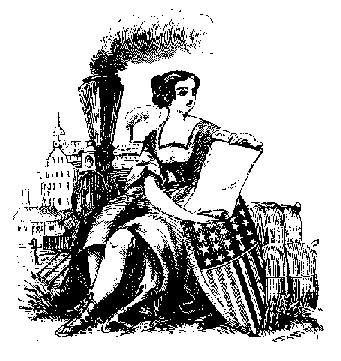
CIVILIAN IMPACT OF CIVIL WAR RAILROAD OPERATIONS

As would be the case in any wartime situation affecting an entire state, the civilian population of Tennessee suffered many tribulations during the Civil War. Among these were serious inconveniences related to rising costs as well as diminishing services for civilians on the part of Tennessee railroads. These difficulties arose from several inter-related factors: military transportation needs took priority over civilian needs; railroad facilities deteriorated through overuse and shortages of essential equipment and supplies; and much railroad property was physically destroyed through the military actions of the contending Confederate and Federal forces.
Evacuation Woes at Nashville
The civilian impact of the Civil War often went far beyond mere inconvenience, at times involving outright panic and violence, as illustrated by the attempted evacuation of Nashville after the fall of Fort Donelson in February 1862. Upon news of the fort's capitulation, crowds of panicked civilians rushed to board the few railroad cars available for southbound transportation over the Nashville & Chattanooga (see N&C page for map) Railroad. The N&C President, Major V. K. Stevenson, could not be found and was rumored to have fled on a special train with his personal belongings--an especially unfortunate situation, since Stevenson was also the official quartermaster responsible for the massive quantity of government supplies stored in Nashville. To make matters worse, a severe washout blocked all traffic over the N&C, preventing the evacuation of civilians as well as military materiel. This severe logistical failure, which occurred before Federal patrols ever reached the city, caused untold civilian suffering as well as contributed to the increasingly severe materiel shortages facing the Confederate military.
Businesses in Boxcars
An unusual aspect of railroad operations during the Civil War was commercial business conducted in boxcars. Although the fact that military photographers utilized boxcars for traveling studios is widely known, it is perhaps less commonly realized that civilian businesses--notably journalists--sometimes took advantage of rail transport. The Chattanooga Daily Rebel was published for several months in a traveling boxcar--in many cases, it was the only available source of news for Confederate soldiers stationed in the Deep South. The press and type of the Memphis Daily Appeal were removed to safety by freight train when that city faced a naval battle. In both cases, the rapid transportation provided by railroads enabled the Confederate newspapers to continue publication, even as they continually retreated from approaching Federal forces.
African-Americans and the Railroads
The African-American population was affected by railroad operations during the Civil War. Before the war, several Tennessee railroads (e.g., the N&C) had actually owned slaves. Probably the majority performed hard manual labor associated with maintenance of way, but some served in various capacities on train crews. As Federal forces conquered formerly Confederate areas, freed blacks found railroad-related employment. Many black workers participated in building the only new railroad constructed by the U.S. Military Railroad in Tennessee: the Nashville & Northwestern (see N&NW pages for map and photographs), with extensive new construction between Kingston Springs and Johnsonville. (Black soldiers also served as guards on the N&NW.)
Profits from Wartime Railroads
Although most of the war's impact on civilians was essentially negative, it should be pointed out that some railroad-related civilians managed to greatly profit under these conditions. Indeed, many railroad companies, owners, and employees benefited personally from profits gained through heavy rail usage (see discussion on Confederate railroads page), despite the overall destructive effects of wartime railroad operation. Some successful entrepreneurs depended on the railroads (but were not railroad employees themselves) : e.g., hotel proprietors (see Crutchfield House in Chattanooga) who provided room and board to both civilian and military rail travelers, and sutlers who provided a variety of goods in spite of wartime scarcities. Often these entrepreneurs were strongly accused of excessive price gouging, but to be fair it must admitted that they offered goods and services at considerable cost and risk to themselves.
![]()
UNDER CONSTRUCTION
![]() Tennessee
Civil War Railroads | Civil
War Technology & Industry in Tennessee
Tennessee
Civil War Railroads | Civil
War Technology & Industry in Tennessee
Last update: May 10, 2000